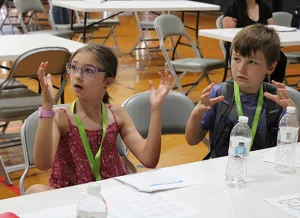Webinar Series to Help Families, Caregivers and Youth Navigate the Transition to Adulthood
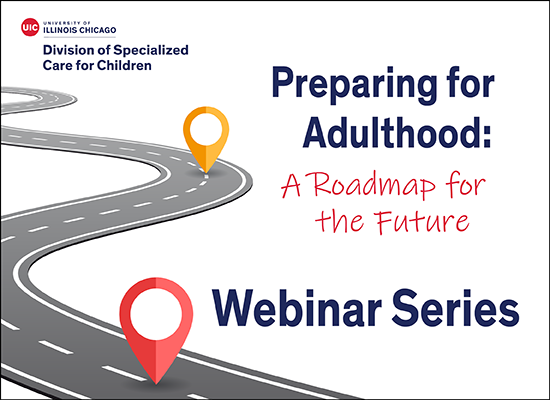
Learn practical strategies and tools to plan for the transition to adulthood during our free two-part series
Families can face new challenges and shifting roles as young people move toward adulthood.
Join the Division of Specialized Care for Children (DSCC) to learn more about navigating this journey during our free “Preparing for Adulthood: A Roadmap for the Future” webinar series.
The two-part series will feature Claire Cook, DSCC Title V Transition Specialist, and Suzanne Aaron, Northern Illinois Outreach Specialist for Illinois Life Span.
The sessions will cover:
- “Session One: Navigating Adult Systems,” June 26 at 6 p.m.
This session is for youth ages 12 to 15 and their families. Families with children at other developmental stages are also welcome to attend.
This session will provide practical tools for exploring and understanding adult systems, such as health care, education, employment and more. It will also cover strategies for balancing independence and guidance as family roles evolve.
- “Session Two: Empowering Parents and Caregivers,” July 31 at 6 p.m.
Session two is for parents, caregivers and families of youth ages 16 and older with complex needs and/or disabilities.
Building on session one, participants will dive deeper into adult guardianship, health insurance, benefits and programs for youth with complex needs. The session will focus on creating meaningful daily routines while managing evolving family dynamics. It will also explore the role of support circles and how to make decisions that support youth and caregivers in the long run.
- “Primera sesión: Recorrer los sistemas de los adultos,” 26 de junio a las 6 p. m.
Esta sesión es para padres, cuidadores, familias y jóvenes de 12 a 15 años. Las familias de jóvenes en otras etapas de desarrollo también son bienvenidas.
- “Segunda sesión: Empoderar a los padres y cuidadores,” 31 de julio a las 6 p.m.
Según la primera sesión, este seminario web se centrará en tutela de adultos, seguro médico, beneficios y programas para jóvenes con necesidades complejas, crear rutinas diarias importantes mientras se maneja la dinámica familiar en evolución y la función de los círculos de apoyo y cómo tomar decisiones que apoyen a los jóvenes y a los cuidadores a largo plazo. Esta sesión ofrecerá a las familias conocimientos y estrategias adaptadas a sus retos únicos.
Each presentation will be in English. Live Spanish interpretation will be available.
The recordings and slides for both sessions will be available on our Family Education Webinars page.
If you have questions about the series, please contact Claire Cook at clairer3@uic.edu or (800) 322-3722.
Please spread the word and plan to join us!
Former DSCC Participant Connects Youth with Hearing Loss to Services and Support
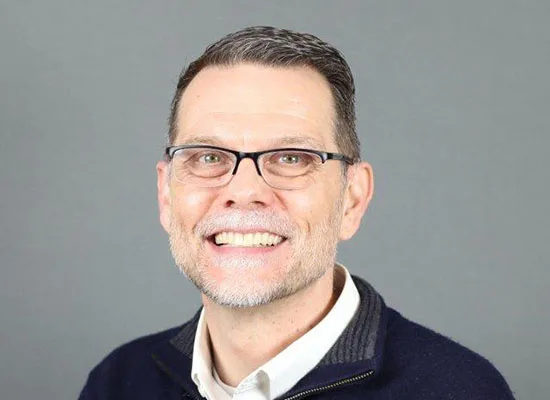
Todd Williams received Division of Specialized Care for Children (DSCC) support growing up and now leads the Evaluation Center at the Illinois School for the Deaf
Todd Williams has come full circle.
Todd, 53, grew up with hearing loss that wasn’t diagnosed until late in his childhood. He enrolled with the University of Illinois Chicago’s Division of Specialized Care for Children (DSCC) and a new world of access opened to him.
That access and support led him to a career that’s opening doors and opportunities for countless other Illinois families of children who are deaf or hard of hearing.
Todd is currently the Evaluation Center Director at the Illinois School for the Deaf (ISD). In this role, he helps school children with hearing impairments all over Illinois receive the right assessment, enrichment and intervention services.
Todd also speaks with parents during the annual Institute for Parents of Preschool Children Who Are Deaf or Hard of Hearing on the ISD campus in Jacksonville each June. The Institute is a partnership of DSCC, the Illinois School for the Deaf and other sponsors. It provides valuable education, resources and connections to families of young children with hearing loss in Illinois.
“My involvement with Parent Institute is just to be an advocate and tell them… ‘I’m a client of this program. So, please take advantage of the services that are out there,’” he said.
“The services don’t just come to you. You have to make an effort.”
Todd explains more about how he helps empower and inspire Institute families in the video below:
Todd says he is thankful for the support his family received when they needed it most.
He was in the sixth grade when his language arts teacher noticed something was “off” and mentioned it to his mother.
“Sometimes you don’t know what you don’t know until you do,” Todd said. “Once my hearing was tested, they couldn’t figure out why I was functioning so well! I remember being able to read lips. Even though I might not hear the bell ring, I could see what the other kids were doing and follow along.”
Todd said his hearing loss was mild to moderate at that time, and school wasn’t a struggle.
He was then diagnosed with bilateral sensorineural hearing loss, a condition where there is damage to the tiny hair cells in the inner ear (known as stereocilia) or to the nerve pathways that lead from your inner ear to the brain.
“We don’t know what caused my hearing loss, but I was sick a lot as a young child with allergies and ear infections,” Todd said. “I must have had hearing at some point because I know what letters and other sounds should sound like, so my speech wasn’t greatly impacted.”
He attended public school during the recession of the 1980s, and money was tight for his family as they started researching how to best support his hearing loss.
“The economic situation was terrible, and probably everybody in town was getting or needed some sort of assistance,” Todd explained.
His mom attended a town meeting about available services, and a woman told her about DSCC.
“That was back when DSCC was called the Division of Services for Crippled Children,” Todd said. “Thankfully, the name has changed, inclusion is growing, and the woman impressed on my mom that DSCC could help.”
For 87 years, DSCC has partnered with Illinois families to help connect children with special healthcare needs – including hearing loss – to the services and resources necessary to reach their full potential.
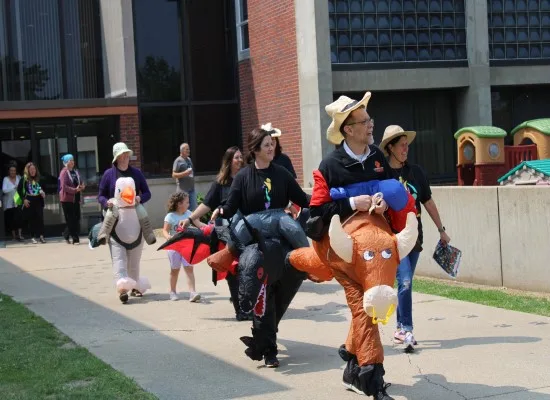
Thanks to DSCC, Todd began to see audiologists and providers who could help. He also received financial support for the cost of his first hearing aid. (DSCC can provide financial assistance for some eligible medical expenses when families meet certain income guidelines.)
“Having my hearing aid was access. We would have found the money somewhere, but it would have been an incredible hardship,” Todd said. “It was no coincidence that things fell in line. With DSCC it was amazing, perfect timing. That’s the beauty of it.”
Later, when his family moved, DSCC went with them.
“No matter where you go in Illinois, DSCC is there,” Todd said. “They were there to help my family with appointments and hearing aids. I got a second hearing aid when I was a sophomore and getting closer to aging out of the program.”
Todd later started planning for college. He took a placement test at John A. Logan Community College in Carterville. While there, a gentleman saw his hearing aids and gave him contact information for the Division of Rehabilitation Services (DRS or DORS) program.
“DORS helps individuals with disabilities become independent, productive citizens. They helped me through school, and I got my master’s at no cost,” Todd said.
He attended Illinois State University and earned a bachelor’s degree in teaching deaf and hard-of-hearing students. He later earned his master’s degree in counseling as well.
Over the years, Todd has worked in education and counseling and served as a deaf/hard of hearing consultant for the state. He also progressed from being hard of hearing to deaf. Todd now has cochlear implants, which unlocked a new world of sounds for him.
He became ISD’s Evaluation Center Director in December 2020. He says he enjoys empowering families and serving as a role model for youth with hearing loss.
“I had a little kid come up to me in the dining hall who was all excited because I had two implants just like him,” Todd said. “So, there’s the role model part, too, which is important for our kids to see that adults do walk around with these (implants), and they are successful.”
Todd encourages families of young children with hearing loss to attend the Institute and learn how ISD, DSCC and other state programs can benefit their children and families.
“Don’t miss out on a chance when you can really gain the most comprehensive evaluation for your child, and the resource list will be phenomenal,” Todd said.
“You have the ability to ask questions, to get questions answered that maybe you’re not feeling comfortable with asking in another setting. That’s what we’re here for. We’re here to answer questions and become a resource for you so the programing for your child can be the best that it can be. That’s our goal.”
Institute Provides Education, Support and Connection for Families of Children with Hearing Loss
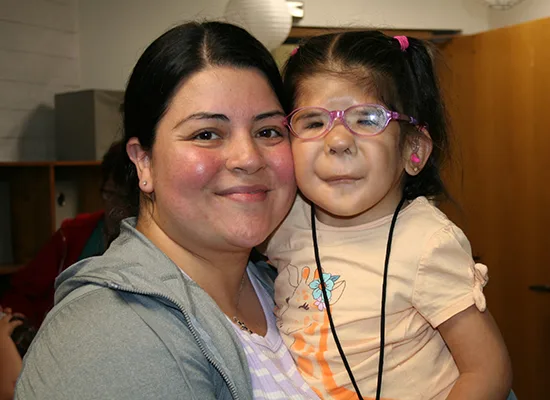
Illinois families gained knowledge and formed priceless relationships during the 2023 Institute for Parents of Preschool Children Who Are Deaf or Hard of Hearing.
The journey to the 2023 Institute for Parents of Preschool Children Who Are Deaf or Hard of Hearing was a mixture of excitement, nerves and some fear for Kelly Lane and Crystal Harris.
When they received the flyer for the free one-week program at the Illinois School for the Deaf in Jacksonville, they were skeptical it would be the right fit for their son, Casper.
Casper, 4, has bilateral hearing loss, epilepsy and a developmental delay.
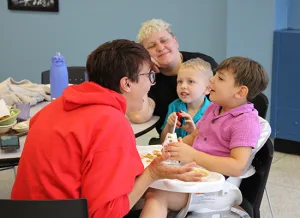
“We’ve been to other events on a smaller scale before that were geared towards families with kids who have hearing loss and felt out of place there because our son also has other disabilities,” Kelly said.
Crystal called the number on the flyer and spoke with Violet Wiker, the Family Liaison for the University of Illinois Chicago’s Division of Specialized Care for Children. Violet helps families enroll in the Institute and addresses any questions or concerns they may have.
Crystal said she talked to Violet for more than two hours.
“She assured me that there were kids of all different learning abilities here, that they would be in a classroom setting… she really sold it to me, really made me feel comfortable,” Crystal said.
She and Kelly then made the trip from Chicago with Casper and his big brother, Courtland. Once they arrived on the School for the Deaf campus, they knew they made the right choice.
“We couldn’t have felt more welcome… We’re used to feeling out of place, so it felt really good to come somewhere and feel normal for once,” Kelly said. “Coming here just felt like going home.”
A total of 22 families from across the state attended this year’s Institute from June 11-16. The Institute is for Illinois parents of children from birth to age 7 who have a significant hearing loss.
Participating parents attend daily lectures by experts in the field to learn about raising a child with hearing loss. Lecture topics include:
- Child development
- Types of hearing loss
- Language development
- Communication choices
- Assistive communication devices
- Deaf culture
- School programming
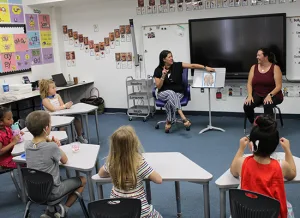
Other activities include meeting in small groups to discuss specific concerns and connecting with other caregivers.
The children with hearing loss attend classrooms based on their age group. Experienced teachers and aides for children who are deaf or hard of hearing oversee these classrooms.
Attending children also can receive hearing, vision, psychological, speech, language and educational evaluations. They also get to play with other children who have a hearing loss.
Siblings also attend the Institute and participate in fun and educational activities, including art projects and learning to sign.
There is no cost for families to participate in the Institute. Meals and housing are provided at no charge.
“One place, all questions answered”
Laura Colic’s son Liam is almost 5 and profoundly deaf. He wears bilateral cochlear implants that he’s had for a little over a year.
“I just wanted to get as much information to make sure that we give him all the opportunities, especially since he’s starting kindergarten in the fall,” Laura said of her decision to attend.
One of her favorite experiences from the week was listening to a panel of Deaf adults share their experiences.
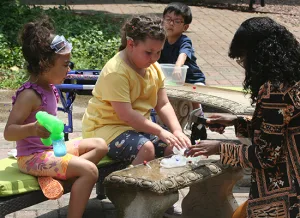
“When you’re in it with little ones, it’s hard to see what that may look like as they grow up. I love the exposure to just the Deaf culture. Even Liam has loved that. He has been so excited to see adults with cochlear implants” she said.
Laura also praised the knowledge of the team of professionals who spoke with families and provided evaluations for the children.
“Their knowledge is phenomenal, and I feel like it’s golden,” she said.
“I wish I could take them with me back home and just create this bubble for Liam. But I’m happy to take the knowledge that they’ve given me, the assessments they’ve provided, the one-to-one time with each of the different people that have worked with Liam and assessed Liam. The evaluations are just phenomenal.”
Sylvia Gavina is mom to 4-year-old Freddy. She appreciated the opportunity to see and understand what Freddy’s hearing loss truly means for him.
“Being able to meet with the professionals and learn what we did in a week takes it to a different level. At home, you might have an appointment one week and then wait three months for the next one. Here, we are leaving with a baseline. One place, all questions answered,” she said.
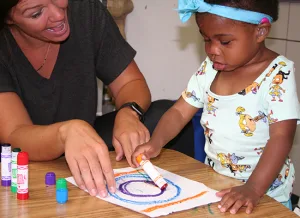
Sheryl Stone’s daughter Nevaeh is 4 ½ and attends the Illinois School for the Deaf. She said the Institute gave her an eye-opening look into how Nevaeh experiences the world. An education session on the Deaf experience helped her understand better what it’s like to not hear and to rely on lip-reading, sign language and other communication methods.
Eddi Fowler said she also learned how to better communicate with her 2 ½-year-old daughter, Kacey. In addition to learning American Sign Language (ASL) and cued speech, Eddi learned more about available resources and how to advocate for Kacey.
“I learned a lot, and I have a lot to take back home with me. I’ve got gigantic paperwork that’s going to help Kacey and my little family throughout the year with her education needs, her hearing loss, her autism, everything,” Eddi said.
“A community of families”
Three-year-old Christian has hearing loss in both of his ears. His parents Basia and Aaron said watching their son become more social with the other children was especially rewarding.
“He’s more expressive. With all the signing and the cued speech that we’re integrating, he’s using his hands more, different modes of communication. That’s something that we were really trying hard to get out of him at home and it’s been tough. But he seemed to really just open up to more people and other children as well,” Aaron said.
Sarah Berns attended the Institute with her son, Colsen, and daughter, Evelyn. Colsen, 7, was born with bilateral sensorineural hearing loss. However, his family was not aware of his hearing loss until he was 3 years old.
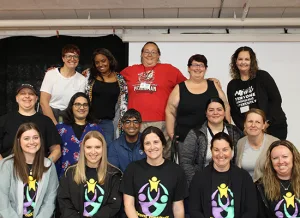
The Institute was the first time he could see other kids with hearing aids and cochlear implants and simply play with them and have fun.
Sarah said she also found a special connection with the other parents.
“I felt like I was all alone. And now I feel like I have a community of families that I can call when I need to talk to them about anything. I also got a lot of information about what my son is going through and what it’s like to be hearing impaired, which is the best connection that I could have with my son, and knowing more about him and what he needs,” she said.
The Institute was also just as valuable for Colsen’s big sister Evelyn.
“She sees that (hearing loss) isn’t something that’s terrible, her brother isn’t annoying, and that there’s this really cool language now that we can have between us that she wasn’t interested in before,” Sarah said. “There’s value in it for her… she has a newfound empathy that she didn’t have before.”
Sarah encourages all families of children with hearing loss to make the trip to the Institute.
“It is life-changing. There are people that value you for who you are, and they are only here to help and give you strategies to help you,” she said.
“A sense of comfort”
After spending a week at the Institute, Kelly and Crystal said they didn’t want to leave.
“We’re not ready to go home. This past week, I’ve felt a sense of comfort that I haven’t felt in a very long time,” Crystal said.
“And that’s saying a lot considering how much information overload has been happening,” Kelly added. “I feel like we should be feeling frazzled and overwhelmed with the amount of new information we’ve gotten, but instead I just feel clarity. I feel clear on where my son’s at, where we need to go, and the options that we have and resources that we have at our disposal.”
Sarah shared a similar sense of peace and optimism for her son, Colsen, after attending the Institute.
“Even though life is not the same plan I thought it was going to be, it’s still going to be wonderful…” she said. “Seeing these other people going through this and through their life, how their life has been impacted by having hearing loss, I realize that (Colsen) really hasn’t lost anything. He is just experiencing it in a different way, and that that’s OK, and that we’re going to be OK.”
Visit our Facebook page to see a photo album with more photos from this year’s program. You can also see videos that highlight different parts of the Institute experience on our YouTube playlist.
The following organizations supported the 2023 Institute:
- University of Illinois Chicago’s Division of Specialized Care for Children (DSCC)
- Department of Human Services – Division of Rehabilitation Services
- Illinois School for the Deaf
- Illinois State Board of Education
- Illinois Department of Public Health
- Ann & Robert H. Lurie Children’s Hospital of Chicago
The 2024 Institute will take place June 13-16. Please see the below flyers for more details:
For more information about the Institute and how DSCC supports children with hearing loss, call (800) 322-3722 or email dsccinstitute@uic.edu.
Upcoming Education and Scholarship Opportunities for Young Adults with Disabilities
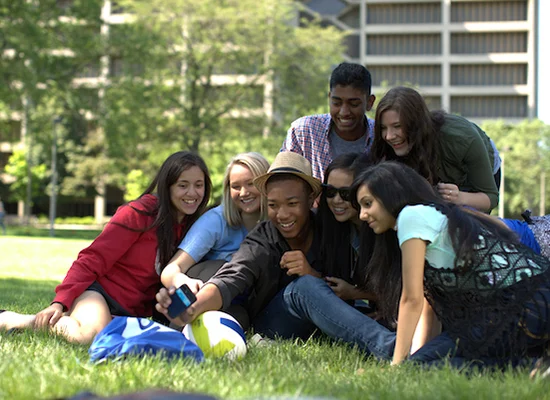
Learn more about the Illinois Community College Initiative and 2023 CSBG Scholarship Program
Finding the right programs and resources is key when planning for the future as a young adult with disabilities.
Two programs currently offer valuable education, training and scholarship opportunities for Illinois youth interested in college or joining the workforce after high school.
Illinois Community College Initiative
The Illinois Department of Human Services’ Division of Rehabilitation Services (DRS) wants to help people with disabilities in their quest for success.
The Illinois Community College Initiative provides academic and vocational training programs for eligible students with disabilities at in-state public community colleges and approved community colleges bordering the state.
People with disabilities who are eligible for the DRS vocational rehabilitation program are eligible to participate. You may complete community college coursework leading to an associate degree or to a degree, certificate or other industry-recognized credential or certificate.
DRS will help you with:
- Tuition
- The cost of fees, books and supplies
- Transportation costs
- Other eligible costs
See the Illinois Community College Initiative flyer for more details.
Spanish-speaking families can listen to the radio ad or read the ad transcript in Spanish.
Ready to get started? Contact your local DRS office using the locator tool or call (877) 581-3690. TTY and relay callers can dial 711.
2023 C.E.F.S. Economic Opportunity Corporation’s CSBG Scholarship
C.E.F.S. Economic Opportunity Corporation has a scholarship program to help students pay for college or occupational training.
The CSBG College Scholarship program provides financial help to income-eligible students living in the following counties:
- Christian
- Clay
- Effingham
- Fayette
- Montgomery
- Moultrie
- Shelby
You can use the scholarship to pay for formal education or occupational training in an accredited Illinois educational institution. Training and degrees may include:
- Associate, bachelor’s or master’s degree, post-secondary education
- General education, short-term training (two years or less) in growth occupation skills
The CSBG scholarship is competitive and awards students based on:
- Income
- The interview process
- Choosing to go into high technology areas or other growth occupations
Previous scholarship recipients can submit an application. You must be enrolled or intend to enroll as full-time students for the fall 2023 semester in an Illinois-accredited college. Full-time is 12 hours or more.
Click on the CSBG Scholarship application or get an application at your county C.E.F.S. outreach office. The application includes contact information for each local office.
You can also visit the C.E.F.S. website for more information.
You must complete your application and submit all requested documents to your local office by April 14 at 4 p.m.
All eligible candidates will have an interview in May.
Find More Transition Resources
Visit the Transition Tools section of our website to find more programs and information to help with planning and paying for college, getting a job and more.
You can browse the Transition: Education Resources and the Transition: Work Resources categories to find what you need.
Our team is also here to help partner with you and your family to help make the transition to adulthood as successful as possible.
Contact us to find out more!
Award Opportunity for Students Who Fight Ableism in Education
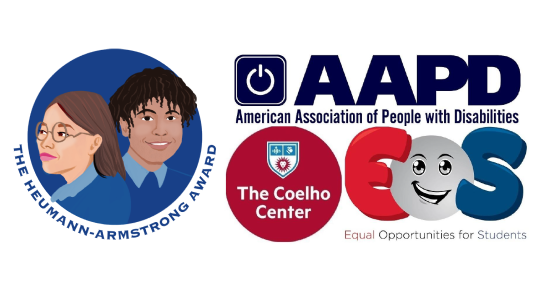
The Heumann-Armstrong Award is for students in sixth grade and up, including higher education
Ableism can take many forms. It is discriminating against someone because of their disability. It can also include bullying, isolation or the refusal to give accommodations to a student with a disability.
Like other forms of discrimination, ableism shows up in ways that are both blatant and subtle.
The Heumann-Armstrong Award is for students in sixth grade and up, including higher education, who have experienced and shown a passion for fighting ableism in education.
The American Association for People with Disabilities, The Coelho Center and Equal Opportunities for Students (EOS) sponsor this award program.
The award started in May 2021. It is named for two disability rights champions:
- Judith (Judy) Heumann, a lifelong and internally recognized advocate for the rights of individuals with disabilities
- Elijah Armstrong, who has epilepsy and founded the EOS organization to help tell the stories of marginalized students in education
The award program defines a disability as any physical or mental condition that affects how someone attends classes, participates in extracurricular activities or socializes with classmates.
Students can submit an application in writing or by video. All applicants must be willing to do a video interview upon winning the award.
Six individuals will receive an education award that includes a $1,000 prize and a video interview posted on EOS social media platforms. Six semi-finalists will also receive recognition.
See the 2022-23 Heumann-Armstrong Award application page to apply.
You can also check out the Heumann-Armstrong Award frequently asked questions and the 2022-23 award opening video for more details.
The deadline to submit applications is July 22.
If you have questions, contact equalstudentopportunities@gmail.com.
Scholarships for Illinois Adults With Spina Bifida
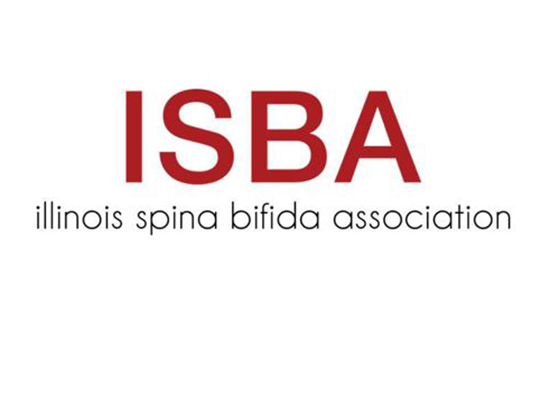
Three scholarship opportunities available
Are you an Illinois adult living with spina bifida and continuing your education?
The Illinois Spina Bifida Association (ISBA) is now accepting scholarship applications for the 2021-22 school year.
Several scholarships are available and may be used for a range of post-high school adult education, including:
- Two- and four-year college programs
- Graduate school
- Online courses
- Technical or trade schools
- Other continuing education opportunities
The ISBA scholarship application is available at https://i-sba.org/programs#scholar.
The ISBA’s three scholarship opportunities are:
- The Patrick Juris Scholarship is awarded to a student with spina bifida preparing for a field of service that helps others.
- The Valiant Scholarship is awarded to a student who displays outstanding leadership, goodwill toward those less fortunate and dedication to making a difference.
- The Mary Mayer Scholarship is in memory of a fiercely independent individual with spina bifida.
For more details about these memorial scholarships, see the ISBA scholarship application.
The deadline to submit scholarship applications is July 17.
For more information, contact (773) 444-0305 or info@i-sba.org.



